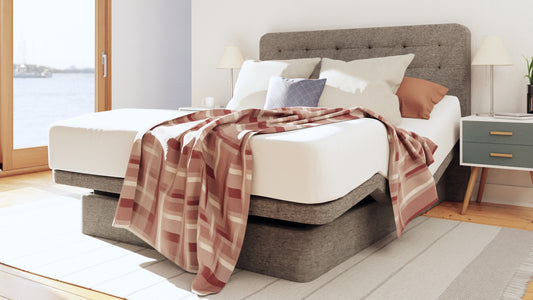If you have ever found yourself battling for blankets, surviving a symphony of snores, or struggling with mismatched sleep schedules, you might wonder if a “sleep divorce” could be the answer.
What is a Sleep Divorce?
Before you let your imagination run wild, a sleep divorce doesn’t involve lawyers or a dramatic breakup. Instead, a sleep divorce is a strategy to reclaim your space and make sure you get your beauty sleep by snoozing solo. Picture this: you and your partner cozying up in separate beds, enjoying a full night of uninterrupted sleep alone. Does that sound like a dream?
The benefits of the right amount of sleep each night are substantial, ranging from an improved immune system and mood to enhanced memory and a decreased risk of stroke, heart disease, and diabetes. Whether you decide to sleep separately on a long-term basis or occasionally retreat to the guest room to catch up on much-needed sleep, rest assured this strategy is more prevalent than you might think. Research conducted by the International Housewares Association for The New York Times showed that one in five couples sleep in separate bedrooms, and nearly 1/3 opt to sleep apart on a nightly basis.
It’s important to note that it’s possible for partners to be a great match in most aspects of their lives yet find themselves incompatible when it comes to sharing a bed. The choice to sleep apart shouldn’t be misconstrued as a lack of love for your spouse or an indication that you are bound for an actual divorce. On the contrary, it can signify a deep commitment to helping each other achieve the best sleep possible. [1,2]

Image credit: KampusProduction-pexels
Sleeping Better Separately?
Let’s face it, sharing a bed has its challenges--the midnight tug-o-war for the sheets, roof-raising snoring, and restless leg syndrome marathons. Sleeping apart without any disruptions and waking up feeling rested could be a potential upgrade for your sleep health and relationship.
When partners have differing sleep patterns, habits, or preferences, exploring separate sleeping arrangements could lead to improved quantity and quality of sleep. This choice can bring couples closer by alleviating any resentment tied to disrupted sleep. The result? Elevated moods, sharper memory, stronger immunity, reduced risk of health issues, and an overall better quality of life. Who wouldn’t want that for their partner?
But it is important to acknowledge the advantages of sharing a bed. When partners sleep together, the release of oxytocin and other “love hormones” fosters emotional intimacy and well-being, reinforcing the connection between partners. One study by the Frontier for Psychiatry showed that couples who slept in the same bed get more REM (Rapid Eye Movement) sleep and less sleep fragmentation for better sleep quality. Additionally, co-sleeping can reveal unnoticed conditions. Your partner may point out your heavy snoring, which could be a sleep apnea symptom.
And there is more good news! Like wine and cheese, sleep routines can get better with age. An American Academy of Sleep Medicine survey showed that over 60% of Americans aged 55-64 do not adjust their sleep routine to accommodate a bed partner. And baby boomers are the least likely age group to file for “sleep divorce.” [3,4,5,6]

Image credit: KampusProduction-pexels
How to Stay Together?
You might be thinking, “Won’t separate beds strain our relationship?” Communication is important. Have a heart-to-heart talk about your sleep preferences and be honest about your sleep health. Let your partner know you want to make the most of your waking hours with quality time together. You can still have a well-balanced relationship even if you are alone in your bed at night.
Several items can prove to be helpful to try first before sleeping apart. Ear plugs can offer respite from disrupted noises and snoring. Eye masks can block unwanted light if one partner comes to bed later. Silent alarm clocks that use light or vibration can help with early mornings without disturbing the other. Or you can adjust the time you go to bed, either going to bed later or waking up earlier, to get a little extra sleep or to synch with your partner.
For those considering a sleep divorce, it’s worth exploring the benefits of trying an adjustable bed, such as the Dawn House bed system, before making any decisions. The design of an adjustable bed allows for personalized comfort and can significantly minimize disturbances to your partner’s sleep because the transfer of motion is limited. The award-winning Dawn House sleep system offers an innovative blend of health-monitoring technology and ergonomic support, promoting spinal alignment and relieving pressure points. An adaptable bed ensures individualized comfort within the same bed, potentially eliminating the need for separate sleep arrangements.
Natural Sleep Aid Options
Whether you are sharing a bed or have chosen to sleep solo, we can all have challenges from time to time falling or staying asleep. A natural sleep aid might help. Here are a few helpful ideas:
Bedtime Routine. Stick to a consistent nighttime routine to signal your body to wind down. Try relaxing activities, like reading, gentle stretching, or taking a warm bath. Avoid using electronic devices or doing work before bed.
Exercise. Engage in regular physical activity during the day for better sleep at night. Try to complete your workout a few hours before bed. Intense physical exertion can make it harder to fall asleep.
Melatonin. Melatonin is a hormone that plays a crucial role in regulating your sleep-wake cycle. While melatonin supplements are widely available, consider consuming foods rich in melatonin, such as tart cherries, eggs, fish, and nuts. These natural sources can gently influence your body’s internal clock and promote better sleep patterns.
Bedroom Temperature. Experts recommend keeping your thermostat set between 60 to 68 degrees Fahrenheit (15 to 19 degrees Celsius) for the most comfortable sleep. If you sleep warm, try opening a window, turning on a fan, or finding bed linens and pajamas in breathable cotton, bamboo, or linen.
Meditation and Deep Breathing. Meditation or deep breathing exercises can quiet your mind and lower stress levels when you can't seem to calm your racing thoughts. Mindfulness meditation, progressive muscle relaxation, and guided imagery are powerful techniques to induce relaxation.
White Noice and Nature Sounds. Create a peaceful auditory environment with white noise or nature sounds. These soothing sounds mask disruptive noises and provide a calming backdrop for sleep. Ocean waves, rainfall, or gentle forest rustling can transport you to a calmer place where sleep comes effortlessly.
While it might sound like a bedtime breakup, a sleep divorce can be a solid strategy for a better night's sleep for you and your partner. Whether for the long term or just a night or two, you may find that sleeping apart lets you greet the morning with a smile. And you can share your dreams over morning coffee! [7,8,9]
Featured image credit: TLeish-pexels 6974844
References:
- https://www.ncbi.nlm.nih.gov/pmc/articles/PMC5056590/
- https://www.nytimes.com/2023/02/10/realestate/couples-separate-bedrooms.html#:~:text=Sleeping%20apart%20is%20more%20common,for%20The%20New%20York%20Times
- https://www.frontiersin.org/articles/10.3389/fpsyt.2020.00583/full
- https://academic.oup.com/sleep/article/45/Supplement_1/A4/6592562
- https://aasm.org/wp-content/uploads/2023/07/sleep-prioritization-survey-2023-sleep-divorce.pdf
- https://aasm.org/over-a-third-americans-opt-sleep-divorce/
- https://www.ncbi.nlm.nih.gov/pmc/articles/PMC2849790/
- https://www.sleepfoundation.org/bedroom-environment/best-temperature-for-sleep
- https://www.nccih.nih.gov/health/melatonin-what-you-need-to-know


